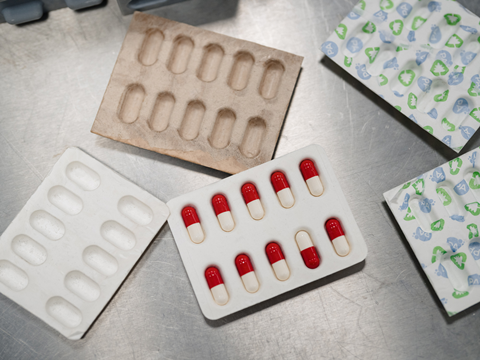
Optima is working with PulPac and PA Consulting to develop bespoke machinery and expand the production of Dry Molded Fiber into coffee capsules, blister packaging, and other complex products.
Compared to conventional fibre forming, the manufacturing process for Dry Molded Fiber claims to speed up the forming process by ten times, utilize much less water and energy, and reduce the CO2 production footprint by up to 80%. It also said to be more cost-efficient.
The partnership between PulPac, PA Consulting, and Optima is set to bolster the scalability, high-throughput production, and industrialization of advanced Dry Molded Fiber packaging. In turn, it hopes to enable brands to utilize Dry Molded Fiber packaging in their complex packaging at scale in line with consumer demand, internal sustainability targets, and legislative requirements.
“To make progress in developing products like coffee capsules and blister packs, they must be manufacturable at scale,” said Keith Thornley, commercial lead for Dry Molded Fiber Collectives at PA Consulting. “We’re excited to work with PulPac and Optima to develop specialized machinery that will enable the high-volume production of complex Dry Molded Fiber products, driving significant advancements in the industry.”
Dominik Bröllochs, director of Fiber Solutions at Optima, continued: “As a one-stop-shop partner for fiber-based packaging, we not only bring our expertise in customized machines to this collaboration, but also our curiosity to push the boundaries of what is possible in the field of sustainable packaging. By integrating optimized solutions for specific Dry Molded Fiber applications, such as the right barrier, we are setting new standards for sustainable products, meeting the demand of brand owners and converters.”
“We have proven that Dry Molded Fiber can be used for making advanced products, but turning that potential into real-world impact requires scaling production to an industrial level,” concluded Viktor Börjesson, chief operations officer at PulPac. “Through this collaboration, we enable brands to adopt more sustainable practices at scale – making a tangible difference in reducing reliance on non-renewable materials and promoting a circular economy.”
These collective efforts are expected to support the work of Dry Molded Fiber initiatives such as the Blister Pack Collective, of which Sanofi Consumer Healthcare became the newest member back in February. Together, the collaborators aim to replace ‘problem plastics’ like PVC in blister pack applications and lower the 100,000 tonnes of plastic thought to be used in medical packaging annually.
Other recent efforts include PulPac’s partnership with Matrix Pack to replace single-use plastic and wooden cutlery with Dry Molded Fiber alternatives; and the recent announcement that The Bottle Collective – which plans to bring bottles made from Dry Molded Fiber to market at scale by 2025 – is testing Dry Molded Fiber bottle caps in an effort to tackle plastic waste.
Meanwhile, Bayer and PAPACKS are also pursuing biodegradable, fibre-based packaging for consumer health brands like Aspirin, Bepanthen, and Claritin using moulded pulp technology and a plant-based coating; and Huhtamaki previously joined forces with Nestlé to produce home-compostable, paper-based coffee capsules using its Fiber Solutions technology.
If you liked this story, you might also enjoy:
The ultimate guide to the Packaging and Packaging Waste Regulation in 2024
How are the top brands progressing on packaging sustainability?
Sustainable Innovation Report 2024: Current trends and future priorities
Everything you need to know about global plastic sustainability regulation














No comments yet